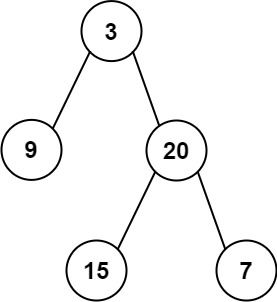给定二叉树的根节点 root ,返回所有左叶子之和。
示例 1:
输入: root = [3,9,20,null,null,15,7] 输出: 24 解释: 在这个二叉树中,有两个左叶子,分别是 9 和 15,所以返回 24
示例 2:
输入: root = [1] 输出: 0
提示:
- 节点数在
[1, 1000]范围内 -1000 <= Node.val <= 1000
# Definition for a binary tree node.
# class TreeNode:
# def __init__(self, x):
# self.val = x
# self.left = None
# self.right = None
class Solution:
def sumOfLeftLeaves(self, root: TreeNode) -> int:
if root is None:
return 0
res = 0
if root.left and root.left.left is None and root.left.right is None:
res += root.left.val
res += self.sumOfLeftLeaves(root.left)
res += self.sumOfLeftLeaves(root.right)
return res/**
* Definition for a binary tree node.
* public class TreeNode {
* int val;
* TreeNode left;
* TreeNode right;
* TreeNode(int x) { val = x; }
* }
*/
class Solution {
public int sumOfLeftLeaves(TreeNode root) {
if (root == null) {
return 0;
}
int res = 0;
if (root.left != null && root.left.left == null && root.left.right == null) {
res += root.left.val;
}
res += sumOfLeftLeaves(root.left);
res += sumOfLeftLeaves(root.right);
return res;
}
}/**
* Definition for a binary tree node.
* type TreeNode struct {
* Val int
* Left *TreeNode
* Right *TreeNode
* }
*/
func sumOfLeftLeaves(root *TreeNode) int {
if root == nil {
return 0
}
res := 0
if root.Left != nil && root.Left.Left == nil && root.Left.Right == nil {
res += root.Left.Val
}
res += sumOfLeftLeaves(root.Left)
res += sumOfLeftLeaves(root.Right)
return res
}/**
* Definition for a binary tree node.
* class TreeNode {
* val: number
* left: TreeNode | null
* right: TreeNode | null
* constructor(val?: number, left?: TreeNode | null, right?: TreeNode | null) {
* this.val = (val===undefined ? 0 : val)
* this.left = (left===undefined ? null : left)
* this.right = (right===undefined ? null : right)
* }
* }
*/
const dfs = (root: TreeNode | null, isLeft: boolean) => {
if (!root) {
return 0;
}
const { val, left, right } = root;
if (!left && !right) {
if (isLeft) {
return val;
}
return 0;
}
return dfs(left, true) + dfs(right, false);
};
function sumOfLeftLeaves(root: TreeNode | null): number {
return dfs(root, false);
}// Definition for a binary tree node.
// #[derive(Debug, PartialEq, Eq)]
// pub struct TreeNode {
// pub val: i32,
// pub left: Option<Rc<RefCell<TreeNode>>>,
// pub right: Option<Rc<RefCell<TreeNode>>>,
// }
//
// impl TreeNode {
// #[inline]
// pub fn new(val: i32) -> Self {
// TreeNode {
// val,
// left: None,
// right: None
// }
// }
// }
use std::rc::Rc;
use std::cell::RefCell;
impl Solution {
fn dfs(root: &Option<Rc<RefCell<TreeNode>>>, is_left: bool) -> i32 {
if root.is_none() {
return 0;
}
let node = root.as_ref().unwrap().borrow();
let left = &node.left;
let right = &node.right;
if left.is_none() && right.is_none() {
if is_left {
return node.val;
}
return 0;
}
Self::dfs(left, true) + Self::dfs(right, false)
}
pub fn sum_of_left_leaves(root: Option<Rc<RefCell<TreeNode>>>) -> i32 {
Self::dfs(&root, false)
}
}/**
* Definition for a binary tree node.
* struct TreeNode {
* int val;
* struct TreeNode *left;
* struct TreeNode *right;
* };
*/
int dfs(struct TreeNode *root, int isLeft) {
if (!root) {
return 0;
}
if (!root->left && !root->right) {
return isLeft ? root->val : 0;
}
return dfs(root->left, 1) + dfs(root->right, 0);
}
int sumOfLeftLeaves(struct TreeNode *root) {
return dfs(root, 0);
}
